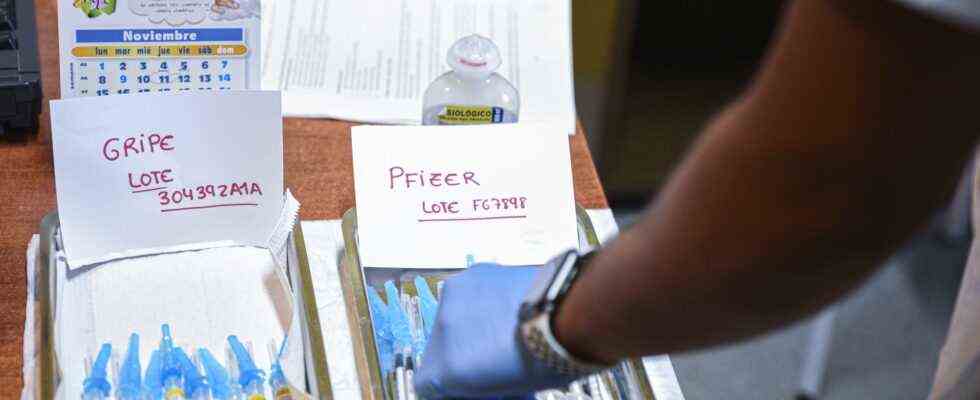Status: 11/21/2021 1:33 a.m.
For a long time, German politicians have resisted compulsory corona vaccination. Now it should come for nursing staff, as in other EU countries. Spain shows how it can be done without.
A vaccination requirement for employees in hospitals and old people’s homes? Rosa Goméz looks confused. “Why should that be necessary?” Asks the nurse. She works in the health center of Carabanchel, one of the southern boroughs of Madrid. “The vaccination rate among my 90 colleagues is 100 percent,” she says. “But they did not get vaccinated because it would have been a duty – no, out of conviction, out of responsibility towards their colleagues and the patients.”
Rosa Gómez can hardly believe that there are actually employees in health professions who speak out against the corona vaccination. When she heard that the vaccination rate for employees in some German old people’s homes was below 50 percent, her mine turned to stone.
Health system largely vaccinated
In Spain, 98 percent of hospital staff are fully vaccinated and around 90 percent of geriatric nurses. It was they who had to witness the dramatic beginning of the pandemic first hand: the completely overcrowded clinics in Spain and the old people’s homes, in which rows of old people died. Rosa Gómez’s neighborhood was particularly hard hit: the south of Madrid at times had the highest number of infections in all of Spain.
“It was terrible. This helplessness, this vulnerability that we were exposed to in the health center. There were no masks, there was no protective clothing,” reports Gómez. “It was clear to us that the only way out of this drama is vaccination. So that we can meet up with others again, feel safe in everyday life and at work. And that’s exactly what happened.”
Goal achieved without coercion
The Spaniards got vaccinated in droves to get their old life back. Around 80 percent of the over-twelve-year-olds have full vaccination protection. And that was achieved without obligation, without compulsion or special incentives, explains preventive medicine specialist José Jonay Ojeda from Madrid: “Above all, the good epidemiological situation in early summer has led to the debate as to whether vaccination should be compulsory or whether it should remain voluntary, never really picked up speed. ”
But in the course of the summer of 2021, the numbers also deteriorated in Spain: Especially young people, whole school classes, became infected with the virus on graduation trips – because they had not previously been vaccinated. The vaccination campaign also came to a standstill among the elderly: many would rather go on vacation than attend the second vaccination appointment. Some politicians were worried that the situation could tip over – for example, Miguel Ángel Revilla, President of the regional government of Cantabria in northern Spain.
Nevertheless, considerations about mandatory vaccination
“I asked Prime Minister Sánchez to find a legal way to enforce compulsory vaccination,” Revilla said in August. “Even if there are hardly any vaccine skeptics in Spain, they can make life difficult for those who get vaccinated and are convinced of its effectiveness. Society cannot allow a few to put us at risk.”
The Cantabrian regional president stepped up a few days ago: In his opinion, the military should be called in if necessary to enforce compulsory vaccinations. With such clear words, Miguel Ángel Revilla is almost alone in Spain so far.
The central government in Madrid is maintaining its stance that vaccination should be voluntary. Even if the number of infections is rising again, the seven-day incidence is currently around 60. Preventive physician José Jonay Ojeda is in favor of targeting those who have not yet been vaccinated and still convincing them of the vaccination: “Me I believe that if we get around the corner with the idea of compulsory vaccination before we have tried everything to get people to vaccinate, that could strengthen the group of vaccination critics. We should therefore exhaust all other possibilities beforehand we bring a duty into play. “
Booster vaccinations necessary
Just recently, doctors wrote in the journal “The Lancet” that Spain had the best chance of achieving herd immunity soon – because of the successful vaccination campaign. However, the authors also emphasize that the positive trend must be consolidated with the booster vaccinations.
Spain is already busy boosting: in the past week alone, the health authorities administered almost a million third-party vaccinations. The Spaniards do not have to worry about their boosters themselves: They receive an appointment proposal from the responsible authorities via SMS or WhatsApp message on their mobile phones. It is the uncomplicated model that the country has already used to organize the many first and second vaccinations.
Nurse Rosa Gómez says that in her health center in Carabanchel almost no one misses the booster appointment. Everyone would come – without any obligation. “If we give you the injection, almost all patients smile and thank us for the vaccination.”

